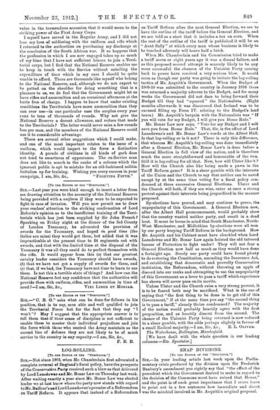LOG-ROLLING.
[To Taw EDITOR Or TIER ''SPROTATOR.,")
Sin,—Nob since 1903, when Mr. Chamberlain first advocated a complete reversal of England's fiscal policy, have the prospects of the Conservative Party received such a blow as that delivered by Lord Lansiowae and Mr. Boner Law on Thursday last week. After waiting ers.otly a year since Mr. Boner Law was elected leader we at last know where the party now stands with regard to Mr. Balfour's and Lord Lansdowne'spromise of a Referendum on Tariff Reform. It appears that instead of a Referendum on Tariff Reform after the next General Election, we are to have the outline of the tariff before the General Election, and we are told as a start that it includes a tax on corn. When the rest of the outline of the tariff is published it will be an "Aunt Sally" at which every man whose business is likely to be touched adversely will heave half a brick.
When Mr. Chamberlain and his Commission tried to make a tariff seven or eight years ago it was a dismal failure, and as this proposed second attempt is scarcely likely to be any more successful the chances of the Unionist Party coming back to power have received a very serious blow. It would seem as though our party was going to imitate the log-rolling tactics of Mr. Asquith's Government. When the Budget of 1909-10 was submitted to the country in January 1910 there was returned a majority adverse to the Budget, and for many weeks the Government did not dare to bring forward their Budget till they had " squared " the Nationalists. (Eight months afterwards it was discovered that Ireland was to be excused filling up Form IV. relating to the Budget's land taxes.) Mr. Asquith's bargain with the Nationalists was "If you will vote for my Budget, I will give you Home Rule."
Mr. Boner Law now says, "Vote for my Budget and I will save you from Home Rule." That, Sir, is the effect of Lord Lansdowne's and Mr. Bonar Law's words at the Albert Hall. Is that log-rolling or is it not P There is only this difference, that whereas Mr. Asquith's log-rolling was done immediately after a General Election, Mr. Boner Law's is done before a General Election in full view of the nation, and is therefore much the more straightforward and honourable of the two. Still it is log-rolling for all that. Now, how will Ulster like it ? How will the Church also like being made a pawn in the Tariff Reform game ? It is a sheer gamble with the interests of the Union and the Church to say that neither can be saved except by at the same time voting for a fiscal policy con- demned at three successive General Elections. Ulster and the Church will both, if they are wise, enter at once a strong protest against their interests being jeopardized in the manner proposed.
By-elections have proved, and may continue to prove, the unpopularity of this Government. A General Election now, after the Albert Hall pronouncement, would probably show that the country wanted neither party, and result in a dead heat. It must be borne in mind that South Manchester, North- West Manchester, and Midlothian by-elections were all won by our party keeping Tariff Reform in the background. How Mr. Asquith and his Cabinet must have chuckled when Lord Lansdowne and Mr. Boner Law again hoisted the old tattered banner of Protection to fight under! They will not fear a General Election now half as much as they would have done a fortnight ago. Surely our party could have found plenty to do restoring the Constitution, amending the Insurance Act, and establishing that democratic and provedly Conservative institution, the Referendum, without throwing an apple of discord into our ranks and attempting to use the unpopularity of this Government as a lever to pass a tariff which experience has shown will never pass mita merits.
Unless Ulster and the Church raise a very strong protest, it is to be feared both may be sacrificed. What is the use of saying that "the first thing to be done is to get rid of this Government," if at the same time you say "the second thing is to pass a tariff," already thrice condemned ? The majority of the nation would probably heartily agree with the first proposition, and as heartily dissent from the second. The chance of the Unionist Party being returned is now reduced to a sheer gamble, with the odds perhaps slightly in favour of
a small Radical majority.—I am, Sir, ,ke , E. L. OLIVER. The Waterhouse, Bollington, Macclesfield.
[We have dealt with the whole question in our leading columns.—En. Spectator.]














































 Previous page
Previous page